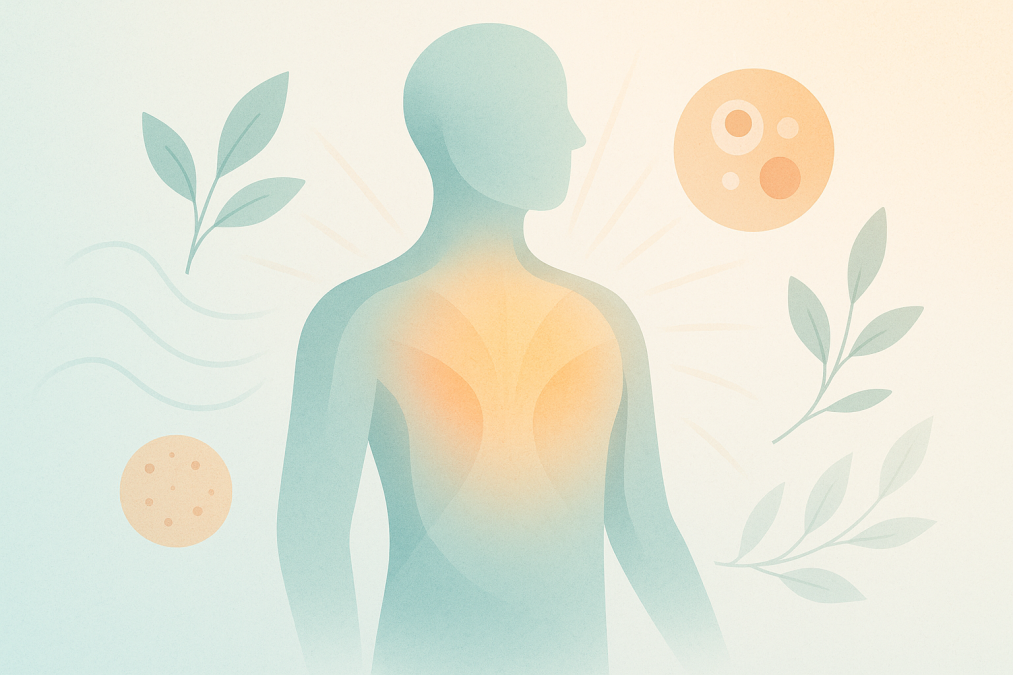Across Australia, especially in major cities such as Melbourne, there has been growing awareness of the need for more personalised approaches to post-viral recovery. Many people are now seeking care from an integrative general practitioner in Melbourne, who combines conventional medical knowledge with a deeper understanding of how nutrition, lifestyle, and functional health testing can influence long-term healing. Modern viruses can affect far more than the immune system. For some people, recovery continues long after the initial infection clears.
Persistent fatigue, muscle aches, and brain fog are increasingly recognised symptoms of post-viral syndromes that can last for weeks or even months. These lingering effects can disrupt work, relationships, and overall quality of life, making it difficult for individuals to regain their usual level of well-being.
Understanding how to support the body through this recovery phase has become an important area of focus for both conventional and integrative medicine. While rest remains a key component, it is often not enough on its own. Integrative medicine offers a broader framework that looks at how all the body’s systems interact and how targeted support can promote full recovery.
Understanding Post-Viral Recovery
Post-viral recovery refers to the period after a viral infection when the body continues to experience symptoms or struggles to regain balance. The immune system, having been highly active during the infection, may remain in a heightened state, leaving people feeling drained or unable to bounce back.
Common post-viral symptoms include fatigue, difficulty concentrating, muscle weakness, and disrupted sleep. Some individuals also experience changes in digestion, appetite, or mood. In Australia, there has been increasing awareness of post-viral fatigue following infections such as influenza and COVID-19, with many people seeking medical guidance to manage these ongoing effects.
The experience is different for everyone, but it often reflects the body’s attempt to restore equilibrium after a period of stress and immune activation. This is where integrative medicine can provide valuable insight and support.
The Role of Integrative Medicine in Recovery
Integrative medicine combines conventional medical assessment with evidence-based complementary therapies. It focuses on treating the whole person rather than targeting symptoms in isolation. This approach acknowledges that physical recovery is influenced by multiple factors, including nutrition, stress, sleep quality, and emotional health.
A holistic general practitioner in Melbourne who specialises in integrative medicine considers how each of these elements interacts. For example, a person’s immune resilience may be influenced by their diet, their ability to rest, and their stress hormone levels. By addressing these areas collectively, integrative medicine aims to support the body’s own healing capacity.
This approach is not an alternative to conventional care. Instead, it complements standard medical management, helping patients recover more fully and sustainably. Each care plan is designed around the individual’s medical history, lifestyle, and current health status, ensuring that treatment is both safe and tailored to their needs.
Identifying the Underlying Factors That Slow Recovery
One of the key strengths of integrative medicine lies in its investigative approach. Rather than focusing only on visible symptoms, practitioners explore potential factors that may be slowing recovery.
For example, chronic inflammation may persist after a viral infection, leading to fatigue or joint pain. Nutrient depletion, particularly of vitamins such as B12, C, and D, as well as minerals like zinc and magnesium, can also affect immune and energy function. Sleep disturbance and ongoing stress further compound the problem by disrupting hormone balance and increasing oxidative stress.
Functional testing can help identify these imbalances. Blood tests, metabolic panels, or assessments of inflammatory markers provide useful information to guide a personalised plan. Understanding what is happening internally allows for more targeted treatment, which is often more effective than generalised advice.
Evidence-Based Strategies Used in Integrative Medicine
Nutritional Support and Replenishment
Nutritional recovery forms the foundation of most integrative treatment plans. A well-balanced diet rich in whole foods, antioxidants, and quality proteins helps restore energy and repair tissues. Some individuals benefit from supplementation, particularly when blood tests reveal deficiencies.
Where appropriate and clinically indicated, intravenous (IV) nutrient therapy may assist with rapid rehydration and replenishment of key vitamins and minerals. Vitamin C, B-complex vitamins, and magnesium are commonly used to support immune and cellular function. However, these treatments are only recommended following professional assessment to ensure suitability and safety.
Mitochondrial and Energy Support
The body’s mitochondria, often referred to as energy-producing structures within cells, can be affected by prolonged illness. Supporting mitochondrial health helps reduce fatigue and restore stamina. Nutrients such as coenzyme Q10, L-carnitine, and B-group vitamins play an important role in this process.
An integrative plan may also include gradual physical activity, breathing exercises, or gentle yoga to help rebuild endurance without overexertion. Patients are encouraged to pace themselves and listen to their body’s cues, avoiding the cycle of overdoing and crashing that often accompanies post-viral fatigue.
Stress Regulation and Sleep Optimisation
Chronic stress slows down recovery. Elevated stress hormones such as cortisol can suppress immune repair and prolong inflammation. Managing stress is therefore essential in post-viral care.
Integrative medicine includes techniques to help regulate the body’s stress response, such as mindfulness, relaxation breathing, and guided meditation. Practitioners may also explore sleep hygiene strategies, ensuring the body has time to recover overnight. Reducing caffeine intake, limiting screen exposure before bed, and maintaining consistent sleep routines are simple but effective steps that can make a significant difference.
Gut and Immune System Connection
The gut plays a central role in immune regulation and recovery. Viral infections, antibiotics, or changes in diet can all disrupt the gut microbiome. This imbalance can contribute to ongoing inflammation, poor digestion, and nutrient malabsorption.
Restoring gut balance through dietary adjustments, probiotics, and fibre-rich foods can help normalise immune function. Integrative doctors often work with patients to identify foods that may be causing irritation or intolerance. Supporting digestive health ultimately strengthens the body’s resilience against future infections and aids overall recovery.
The Importance of Personalised Care
Every person’s post-viral recovery journey is unique. Factors such as age, pre-existing health conditions, infection severity, and stress levels all play a role in determining how long it takes to return to full strength.
Integrative medicine emphasises personalised care. A plan developed for one patient may differ greatly from another’s, even if their symptoms appear similar. Regular follow-up appointments help track progress, adjust treatment, and ensure ongoing support. This flexible and patient-centred model acknowledges that recovery is rarely linear and that gentle, consistent care often leads to the best outcomes.
In Victoria, more people are recognising the value of this approach, particularly when conventional treatment alone does not address lingering fatigue or weakness. By combining medical science with lifestyle and nutritional insights, integrative medicine provides a structured pathway toward lasting recovery.
How Clarendon Medical Supports Post-Viral Recovery
At Clarendon Medical in South Melbourne, integrative and functional medicine practitioners provide comprehensive care for patients experiencing prolonged symptoms after viral illnesses. The clinic combines thorough medical evaluation with evidence-based support designed to restore balance across the body’s systems.
Patients may receive functional assessments to identify nutrient deficiencies, inflammation markers, or hormonal imbalances. Treatment may include nutrition planning, IV vitamin therapy (where appropriate), lifestyle modification, and targeted supplementation. All recommendations are made following a detailed consultation to ensure they are safe and medically appropriate.
Clarendon Medical’s practitioners work collaboratively with GPs, specialists, and allied health professionals to ensure continuity of care. This team-based approach helps patients navigate their recovery confidently, knowing that every aspect of their health is being considered.
FAQs
Q1: What is the difference between post-viral fatigue and chronic fatigue syndrome?
A1: Post-viral fatigue typically follows a viral infection and gradually improves over time. Chronic fatigue syndrome is a long-term condition that may have multiple contributing factors and requires comprehensive management.
Q2: Can integrative medicine help after a mild viral illness?
A2: Yes. Even mild infections can disrupt immune or energy balance. An integrative approach can support faster recovery and help reduce the risk of prolonged symptoms.
Q3: Are supplements always necessary for recovery?
A3: Not always. While supplements can be beneficial for correcting deficiencies, a well-balanced diet and healthy lifestyle are often the first steps. Recommendations should always be based on professional assessment.
Q4: How long does post-viral recovery usually take?
A4: Recovery time varies. Some people improve within a few weeks, while others may take several months to regain full strength. Regular follow-up helps monitor progress and adapt treatment as needed.
Q5: What should I expect during my first appointment?
A5: Your initial consultation will include a detailed medical history, discussion of symptoms, and review of previous tests. Your practitioner may recommend further investigations and will develop a tailored plan to support recovery.
Disclaimer
The information provided in this article is for general educational purposes only and should not be interpreted as medical advice. Please consult your healthcare provider or book an appointment with a qualified practitioner at Clarendon Medical for personalised guidance.



